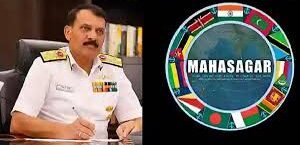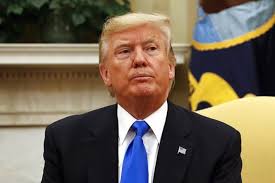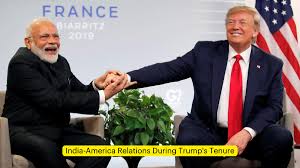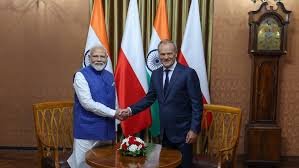PM Modi’s Visit to Poland: Outcomes and Implications
Strengthening India-Poland Relations
Indian Prime Minister Narendra Modi’s recent visit to Poland marks a significant step in enhancing bilateral relations between India and Poland. During his visit, PM Modi held high-level discussions with Polish leaders, focusing on deepening economic cooperation, boosting trade ties, and strengthening diplomatic connections. This visit underscores India’s growing diplomatic outreach and its strategic importance in the Central European region.
Economic and Trade Agreements
One of the key outcomes of PM Modi’s visit was the signing of several economic and trade agreements aimed at fostering closer economic ties between the two nations. The agreements include collaborations in sectors such as technology, defense, and infrastructure. These deals are expected to open new avenues for investment and trade, benefiting both economies by creating jobs and driving growth in key sectors.
Focus on Defense and Strategic Cooperation
The visit also highlighted the strategic partnership between India and Poland, with a particular emphasis on defense cooperation. Both countries agreed to enhance their defense ties, including joint military exercises and the exchange of best practices. This move reflects a mutual interest in strengthening security and defense capabilities in the region, which is crucial given the current geopolitical climate.
Cultural and Educational Exchanges
In addition to economic and defense agreements, PM Modi’s visit emphasized the importance of cultural and educational exchanges between India and Poland. The leaders discussed initiatives to promote people-to-people connections, including scholarships and collaborative research projects. These exchanges aim to foster a deeper understanding and appreciation of each other’s cultures and academic advancements.
Implications for Regional Diplomacy
PM Modi’s visit to Poland is also significant for its implications on regional diplomacy. By strengthening ties with Poland, India is positioning itself as a key player in European and Central European politics. This strategic move could enhance India’s influence in the region and provide new opportunities for diplomatic and economic engagement with other European nations.
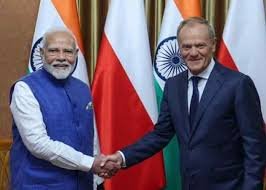
Why This News is Important
Enhancing Bilateral Relations
PM Modi’s visit to Poland is crucial as it signifies a deepening of bilateral relations between India and Poland. Strengthening these ties helps both countries leverage each other’s strengths, promoting mutual economic and strategic interests. This partnership is expected to boost trade, investment, and cooperation in various sectors, contributing to overall economic growth.
Economic Benefits
The agreements signed during the visit promise significant economic benefits for both nations. By focusing on trade, technology, and infrastructure, the deals are likely to create job opportunities, stimulate economic growth, and foster innovation. This economic collaboration is beneficial for students and professionals in related fields as it opens up new avenues for career and business opportunities.
Strategic and Defense Importance
The enhanced defense cooperation between India and Poland is of strategic importance. In the current geopolitical environment, strengthening defense ties helps ensure regional security and stability. For those preparing for government exams, understanding the significance of such strategic partnerships is crucial as it reflects broader global security dynamics.
Cultural and Educational Impact
The emphasis on cultural and educational exchanges highlights the importance of soft power in international relations. For students and aspirants in the government sector, knowledge of these exchanges is important as it showcases India’s commitment to fostering global understanding and collaboration.
Regional Diplomacy
India’s growing influence in Central Europe through its strengthened ties with Poland has broader implications for regional diplomacy. Understanding these dynamics is key for those studying international relations and global diplomacy, as it affects India’s role and strategy in European politics.
Historical Context
India-Poland Relations: A Historical Overview
India and Poland have shared diplomatic relations since the early 1950s. Over the decades, the relationship has evolved, with both countries collaborating in various fields including trade, defense, and culture. The recent visit by PM Modi to Poland is a continuation of this longstanding partnership, aimed at revitalizing and expanding the scope of bilateral cooperation.
Key Historical Events
- 1954: Establishment of diplomatic relations between India and Poland.
- 2001: Signing of the India-Poland Bilateral Investment Promotion and Protection Agreement.
- 2018: State visit by Polish President Andrzej Duda to India, which laid the groundwork for enhanced bilateral ties.
These historical milestones reflect the growing depth of the relationship and set the stage for the current advancements in bilateral cooperation.
Key Takeaways from PM Modi’s Visit to Poland
| Serial Number | Key Takeaway |
|---|---|
| 1 | PM Modi’s visit to Poland strengthens India-Poland bilateral relations. |
| 2 | Several economic and trade agreements were signed, focusing on technology, defense, and infrastructure. |
| 3 | Enhanced defense cooperation includes joint military exercises and exchange of best practices. |
| 4 | The visit emphasized cultural and educational exchanges, including scholarships and collaborative projects. |
| 5 | Strengthening ties with Poland boosts India’s influence in Central European diplomacy. |
Important FAQs for Students from this News
1. What was the primary focus of PM Modi’s visit to Poland?
PM Modi’s visit to Poland primarily focused on strengthening bilateral relations, including economic, defense, and cultural cooperation. Key outcomes included the signing of several trade agreements, enhancement of defense ties, and promotion of cultural and educational exchanges.
2. What economic agreements were signed during the visit?
During PM Modi’s visit, several economic agreements were signed covering areas such as technology, defense, and infrastructure. These agreements aim to boost trade and investment between India and Poland, benefiting both economies.
3. How does the defense cooperation between India and Poland impact regional security?
The enhanced defense cooperation, including joint military exercises and exchange of best practices, is intended to strengthen regional security and stability. This partnership helps both countries address common security challenges and enhances their defense capabilities.
4. What are the benefits of the cultural and educational exchanges emphasized during the visit?
The cultural and educational exchanges aim to foster a deeper understanding and appreciation between the two nations. Benefits include scholarships, collaborative research projects, and enhanced people-to-people connections, which contribute to mutual cultural enrichment and academic advancement.
5. Why is PM Modi’s visit to Poland significant for India’s global diplomacy?
The visit is significant as it highlights India’s growing influence in Central Europe and strengthens its diplomatic ties with Poland. This enhanced relationship positions India as a key player in European politics and opens up new opportunities for international engagement.
Some Important Current Affairs Links



